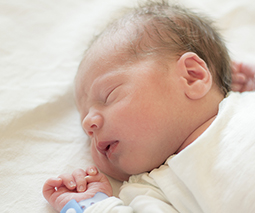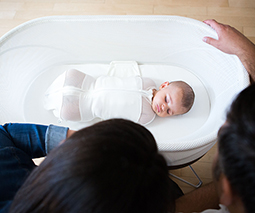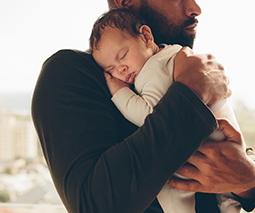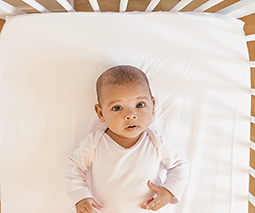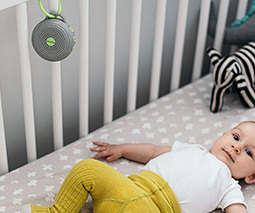The real reason why your newborn is keeping you up all night

Feel like your newborn has her day and night mixed up? You aren’t alone.
Dave a new first-time dad, called Helpline to chat to mothercraft Chris Minogue about his daughter’s sleep patterns. And while Dave and his partner appreciate that their newborn might initially be a little confused between days and nights, he was wondering if there is anything they can do to help bring her around to a schedule that would suit them better.
Although Chris was able to address his questions and offer some clarity, and a little bit of hope, the answer might not be what parents want to hear.
Listen to Chris Minogue on Feed Play Love:
There is no day and night
According to Chris, in the first three to four weeks of a baby’s life, they’re not actually the wrong way around, it’s just that there is no day and night.
“They don’t have that concept of day and night,” she says. “But to us, as the parents or the adults in this situation is, it feels like they’re awake a lot more at night than they are in the day and that’s got to do with the types of stimulation that they get.”
Born to feed, not to sleep
Surprisingly, sleep is not a priority for a newborn – despite the fact that it probably is for parents.
“The first thing, which is the most frightening piece of information when bringing a baby home, is that they’re born to feed, not to sleep,” says Chris. “They often cluster feed in the first three to four weeks at night, so you often perceive that as an unsettled period.”
Chris explains that this will drag out to the evening and then the day, but not until your baby is at least three weeks old.
“Under three weeks old, it’s quite a chaotic pattern,” she tells Dave. “She can feed anywhere from two and a half hours to four hours. The feed probably takes anywhere between 45 minutes and an hour and she needs at least an hour and a half of sleep to have the energy to feed well.”
This time is really about getting used to the baby being around and concentrating on her feeding.
“The only thing that we’ve set into place is that she has her feed, then she gets wrapped and then she gets cuddled,” says Chris. “At this point, there’s not a lot about the settling.”
To help with the transition, Chris says, “Just cuddle her till she’s calm or sleepy, then pop her into a bed, but tuck her in and when you put her into the bed, put your hand on her and gently rock, and it’ll start to give her that transition between being held and being put down in a bed.”
At this stage, it is not unusual for you to feed overnight at 11pm, 1am and then 3am, and that the baby isn’t very settled in between. “As long as the rest of the day, the 24 hours, she’s feeding and sleeping.”
Will it get better? And when?
Luckily for Dave, and indeed all parents, this will eventually change.
“At six weeks they have the maturity to understand, or just to sleep longer at night,” says Chris. “They’re more alert, they can see further, so in the day, they’re concentrating on the light out the window, your face and your face features so by the night, she’s just a little bit more tired – but you can’t tire her out under the six weeks because she gets overtired too quickly.”
It’s a fine line but if Dave can just hunker in for the next couple of weeks, things will improve.
“I have to say at three weeks, it does get dramatically better in that she sleeps better between the feeds, regardless of the frequency of the feeds,” she says.
When you’re up every night, three weeks does seem like an eternity, but even so, for Dave, this sounds like good news.
“Looking forward to that,” he says.
 Need some more baby sleep advice? Our Parent School sleep experts can help. Click to find out more or book a one-on-one session.
Need some more baby sleep advice? Our Parent School sleep experts can help. Click to find out more or book a one-on-one session.

